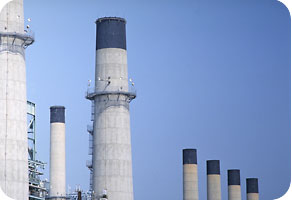MACT Testing
Industrial Boiler MACT Testing
Columbia Analytical provides analytical services to support a wide variety of applications associated with MACT (Maximum Available Control Technology) testing. These include RCRA Trial Burns, MACT performance evaluations, boiler and industrial furnace units (BIFs), Industrial Boiler MACT rule for Hazardous Air Pollutants (HAPs), as well as numerous miscellaneous applications from a variety of industries. The analysis of emissions, fuel, and/or residue can be included in the scope of services per project. Chemical and physical properties are routinely evaluated. Test parameters include heating value, halogens, halides, ash, moisture, viscosity, density, metals, and other parameters specific to given waste feeds.
Boiler MACT Fuel Testing
In some cases, this rule requires boilers to test their air emissions for Chloride, Metals, and Particulate Matter. Columbia Analytical provides EPA Method 29 (metals) and EPA Method 26 (HCl). In addition, solid fuels might also be tested under this regulation. Columbia Analytical has worked closely with NCASI to develop appropriate test procedures for the milling and analysis of samples for Total Cl, Total Metals, Mercury, Moisture, and Heating Value. All of these data are required for computations associated with showing compliance with the MACT Rule.
NCASI Methods
Columbia Analytical also performs the complete NCASI 99.02 air method, a required test under the Plywood and Composite Wood Panel MACT Rule. We perform both the canister and impinger portions of the method. To date, we have successfully provided analytical support to numerous source testing companies going through the process of demonstrating competence with the procedure as outlined in the method. Columbia Analytical personnel have worked closely with NCASI and others in the wood products industry to bring procedures and processes online that help assure method requirements are achieved. We also perform the approved NCASI methods for methanol (NCASI 94.03) and for methanol, acetaldehyde, methylethylketone (MEK) and propionaldehyde (NCASI 99.01). NCASI 99.01 is designed for HAPs in condensates, but has also been adapted for HAPs in aeration pond samples. In addition, if the “hard piping” alternative is being used, we can alert appropriate mill personnel to potential problems if the concentration of concern is known.
